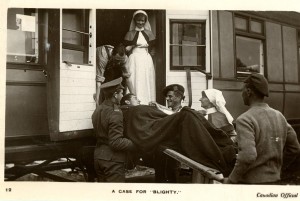
A wounded soldier destined for further care away from the frontlines.
Canadian Official.
Now me, I wasn’t scratched, praise God Almighty
(Though next time please I’ll thank ‘im for a Blighty)
From The Chances by Wilfrid Owen
Home
Blighty was Britain or England. The term was popular in both the First and Second World War but its origins were earlier. The word originated in India during the 1800s where blighty was used as slang to describe an English or British visitor. Additionally the term was used to describe specific items the British introduced to India such as tomatoes and soda water.
Blighty, as a term for home, was used by the British during the Second Boer War 1899-1902. Specific to being wounded a blighty was one when an injured soldier was bound for further care in Britain that required recuperation at home. Blighty magazine was a weekly edition produced during the Great War intended to be humorous featuring short stories, cartoons, poems and art such as illustrations and paintings.
Blighty
It seemed that it were well to kiss first the earth
On landing, having traversed the narrow seas,
And grasp so little, tenderly, of this field of birth
First three lines of Blighty by Ivor Gurney
For information on Great War military hospitals in the British Isles visit the Long, Long Trail.
Tags: Blighty, Home, India, Ivor Gurney, Poetry, Poets, Second Boer War, The Chances, Wilfrid Owen, Wounded
This entry was posted by pferguson
on Saturday, January 27th, 2024 at 9:44 am and is filed under Snapshots of the Great War.
You can follow any responses to this entry through the RSS 2.0 feed.
You can leave a response, or trackback from your own site.
About The Author

Paul has worked with the Paradigm Motion Picture Company since 2009 as producer, historian and research specialist. Paul first met Casey and Ian WIlliams of Paradigm in April 2007 at Ieper (Ypres), Belgium when ceremonies were being held for the re-dedication of the Vimy Memorial, France.
Paul's sensitivity to film was developed at an early age seeing his first films at RCAF Zweibrucken, Germany and Sardinia. Paul returned to Canada in 1967 and was captivated by David Lean's "Lawrence of Arabia" and "Bridge on the River Kwai". Over time Paul became increasingly interested in storytelling, content development, character, direction, cinematography, narration and soundtracks.
At the University of Victoria, Paul studied and compared Japanese and Australian film and became interested in Australian film maker Peter Weir and his film "Gallipoli" (1981). Paul was inspired when he learned Weir visited the beaches, ridges and ravines of the peninsula. "Gallipoli", the film, led Paul on many journeys to sites of conflict in England, France, Belgium, Holland, Germany, Malta, Hawaii, Gallipoli, North Macedonia and Salonika.
When Paul first watched documentary filmmaker Ken Burns, "The Civil War", Paul understood how his own experience and insight could be effective and perhaps influential in film-making. Combining his knowledge of Museums and Archives, exhibitions and idea strategies with his film interests was a natural progression.
Paul thinks like a film-maker. His passion for history and storytelling brings to Paradigm an eye (and ear) to the keen and sensitive interests of; content development, the understanding of successful and relational use of collections, imagery and voice. Like Paul's favorite actor, Peter O'Toole, Paul believes in the adage “To deepen not broaden.”
While on this path Paul always remembers his grandmother whose father did not return from the Great War and how his loss shaped her life and how her experience continues to guide him.


Comments